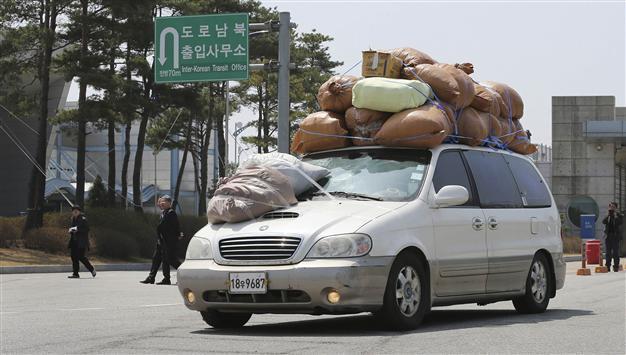Electric cable a lifeline for idled symbol of Korean cooperation
PAJU - Agence France-Presse

South Korean vehicles transporting South Korean employees working at the KIC (Kaesong Industrial Complex) inside the North Korean border and products made in KIC, head toward the South's CIQ (Customs, Immigration and Quarantine), just south of the demilitarised zone separating the two Koreas, in Paju, north of Seoul, April 17, 2013. REUTERS photo
An electricity cable running from South Korea over the border into North Korea is one of last lifelines for more than 200 South Korean workers at a joint industrial park that North Korea has shut down amid fears of war.
About 53,000 North Koreans worked at the Kaesong complex, just inside North Korea, where 123 South Korean companies have set up factories.
North Korea suspended work there last week as it stepped up its threats of war over new sanctions imposed after its third nuclear test in February, snuffing out the last remnant of cooperation between the neighbours.
But just over 200 South Koreans have stayed on in the complex to look after their operations.
While food and fuel are running low, the South Koreans are depending on electricity brought into Kaesong along a 16 km (10 mile) cable from a South Korean border town, for their heating and water supply.
"Electricity is the last means," said a South Korean official at a utility company who used to work in Kaesong.
"If gas is gone, they can make fire from wood but if the electricity is off, things will completely stop," said the official who declined to be identified as he is not allowed to speak to the media.
North Korea issued new warnings of war on Wednesday and also turned down a request by officials from South Korean companies working in Kaesong to visit the complex to deliver food and check on facilities, South Korea said.
The North, in a commentary by its KCNA news agency, said the "puppet" South Korean government wanted to "torpedo" operations in Kaesong and turn it into a "theatre of confrontation" despite its calls to get the complex back to work and for dialogue.
"It is nothing but a crafty ploy to evade the blame for the crisis ... and justify the moves for confrontation and war," KCNA said. "The puppet group can never evade its responsibility for the present grave situation."
A spokesman for South Korea's Unification Ministry, which handles relations with North Korea, rejected such talk.
"The North's claims are unjust and unacceptable," spokesman Kim Hyung-suk told a news briefing. "Pyongyang should take responsible measures to alleviate the plight of workers at Kaesong and normalise operations at the complex as soon as possible."
SHARING FOOD
Kaesong opened in 2004 as part of a so-called sunshine policy of engagement and optimism between the two Koreas, still technically at war after their 1950-53 civil conflict ended in a truce, not a treaty.
North Korea, which has struggled over the years to feed its people, generates barely enough electricity to light even its main residential centres.
In 2005, South Korea proposed supplying 2 million kilowatts of electricity a year if the North abandoned its nuclear arms programme. The North declined the offer and in February conducted its third nuclear test, triggering weeks of tension and threats.
On Wednesday, four South Korean workers returned home across the Demilitarized Zone from Kaesong, one complaining of a stomach ailment.
Colleagues back in Kaesong were surviving on dwindling supplies of instant noodles and sweets, one of them said.
"It's okay because everyone left there is working together and sharing food," said Oh Heung-ki, a 50-year-old worker at a garment factory who drove a van loaded with clothes from Kaesong into South Korea.
The power line is one of two last links across the border. The other is a telephone line allowing workers at Kaesong to talk to their families and companies.
The North simply could not supply power from its own grid if the cable with the South was cut, said the South Korean official.
"If South Korea stops sending electricity, factories there can't run," said the utility company official.
